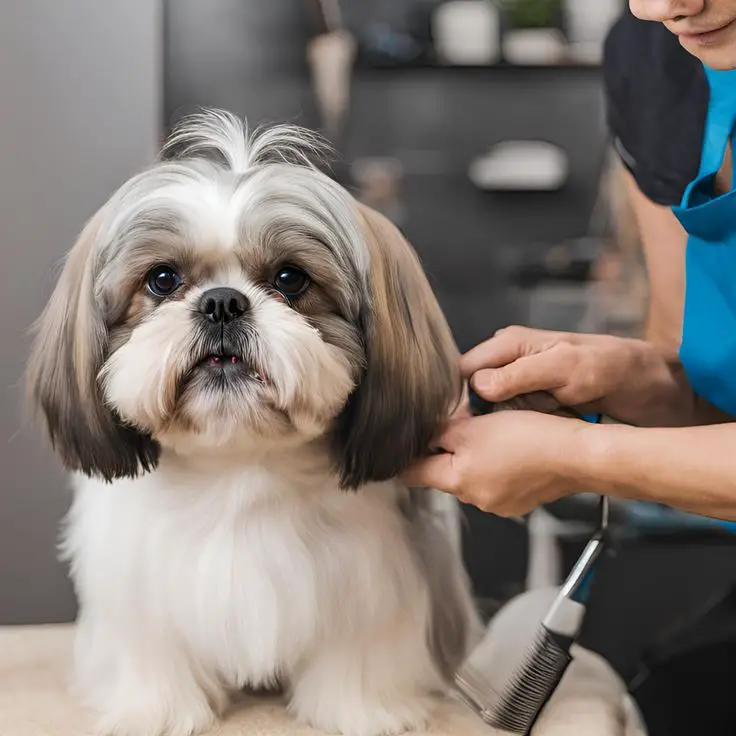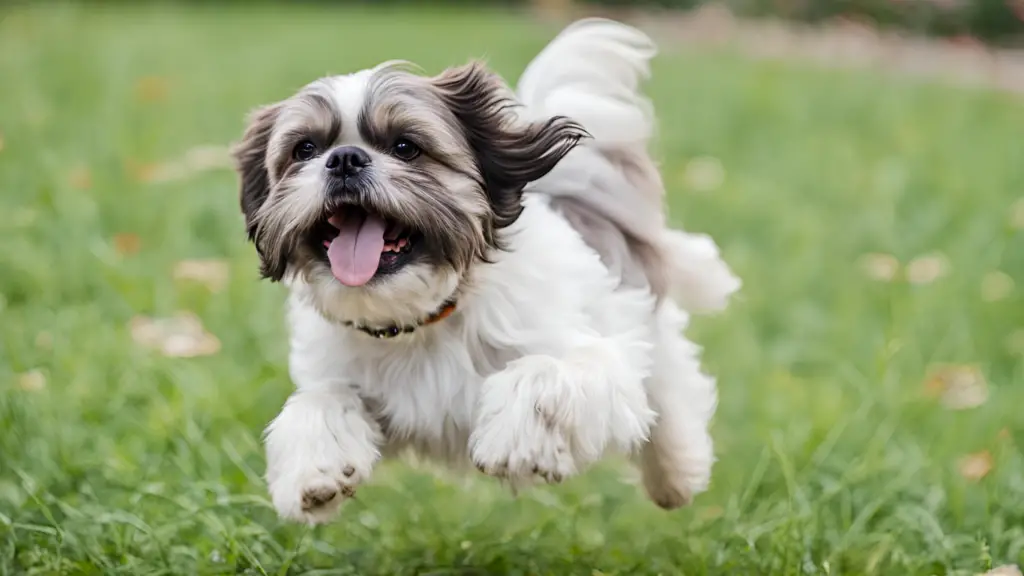
Welcoming a Shih Tzu puppy into your home is a joyful experience, filled with excitement and anticipation. Understanding the different growth stages of your Shih Tzu puppy is essential for providing the best care and ensuring their healthy development. This guide will walk you through each stage of your Shih Tzu puppy’s growth, from newborn to adult, highlighting key milestones, important care tips, and what to expect during each phase.
Newborn Stage (0-2 Weeks): The Beginning of Life

The newborn stage is a critical period for Shih Tzu puppies. During the first two weeks, puppies are entirely dependent on their mother for warmth, nourishment, and care. At birth, Shih Tzu puppies are blind, deaf, and unable to walk. Their primary needs are to be fed and kept warm. The mother’s role is crucial as she provides essential nutrients through her milk, which is rich in antibodies that help build the puppy’s immune system.
In the absence of the mother, if you are caring for a newborn Shih Tzu puppy, you will need to step in with bottle feeding. Use a specially formulated puppy milk replacer and follow the instructions carefully. Ensure the puppy stays warm, as they cannot regulate their body temperature on their own. Regular feeding every 2-3 hours is essential during this stage, and monitoring the puppy’s weight gain is crucial for ensuring they are thriving.

Observing the puppy’s physical development is important. Puppies will begin to open their eyes and ears around the second week, although their vision and hearing will still be developing. They will start to exhibit some motor skills, such as moving their legs and beginning to crawl. At this stage, gentle handling is recommended to get them used to human interaction without causing stress.
Health checks are vital during this early stage. Regular vet visits to monitor growth, check for signs of any health issues, and ensure that the puppy is receiving adequate nutrition are recommended. Ensuring a clean and safe environment is also critical to prevent infections and illnesses.
Transitional Stage (2-4 Weeks): Exploring the World

The transitional stage marks significant developmental changes in Shih Tzu puppies. During weeks two to four, puppies start to explore their environment more actively and show increased physical abilities. Their sensory development progresses rapidly during this period. Puppies will begin to open their eyes fully, and their hearing will improve, allowing them to respond to sounds.
Socialization begins as puppies start to interact more with their littermates and environment. They will begin to play with their siblings, which is crucial for developing social skills and bite inhibition. Introducing a variety of stimuli such as different textures, sounds, and gentle handling helps in their overall sensory development.

Weaning starts during this stage. Puppies will gradually transition from their mother’s milk to solid food. Begin by offering a high-quality puppy food mixed with water or puppy milk replacer to create a gruel. Gradually decrease the amount of milk replacer as the puppies get used to the solid food. Monitor their eating habits and ensure they are getting enough nutrition.
Motor skills improve as puppies start to walk and explore more confidently. Their coordination and balance will improve, and they will become more active and playful. Encourage gentle play and exploration to help them build muscle strength and agility.
Basic training can start during this period. Introduce simple commands like “sit” and “come” using positive reinforcement techniques. This early training helps establish a foundation for more advanced training in the future. Consistency and patience are key as puppies are still learning and developing.
Socialization Stage (4-8 Weeks): Building Confidence

The socialization stage is a crucial time for Shih Tzu puppies. Between weeks four and eight, puppies become more curious and social, and this period is ideal for introducing them to new experiences, people, and other animals. Early socialization is essential for developing a well-adjusted adult dog. Expose your puppy to various environments, sounds, and people to build their confidence and reduce fearfulness.
Puppies are learning to communicate and play with their littermates during this stage. They will begin to exhibit more complex social behaviors and will learn how to interact appropriately with other dogs. Encourage positive interactions and provide opportunities for safe play with other vaccinated puppies and adult dogs.
Health care continues to be important. Ensure that your puppy receives their vaccinations and deworming treatments as recommended by your veterinarian. Regular check-ups are crucial to monitor growth and address any potential health concerns. Discuss your puppy’s development with your vet to ensure they are on track.

Training becomes more focused during this stage. Begin teaching basic commands and practicing house training. Socialization should include exposure to various environments, people, and sounds to help your puppy become accustomed to new experiences. Use positive reinforcement techniques to encourage desired behaviors.
Feeding schedules and nutrition should be adjusted as your puppy grows. Continue to provide high-quality puppy food and monitor their weight to ensure they are growing at a healthy rate. Adjust portion sizes and feeding frequency as needed based on your puppy’s age, size, and activity level.
Adolescent Stage (8-12 Weeks): Growing Independence

The adolescent stage is characterized by increased independence and curiosity. Between eight and twelve weeks, Shih Tzu puppies will continue to grow and develop both physically and emotionally. Puppies may start to test boundaries and exhibit more assertive behaviors. Consistent training and socialization are important to help them navigate this period.
Training and behavior management become more crucial as puppies develop their personalities and test limits. Reinforce basic commands and continue socialization efforts to ensure your puppy remains well-behaved and comfortable in various situations. Establish clear rules and boundaries to help guide your puppy’s behavior.

Physical growth continues rapidly during this stage. Your puppy will gain weight and height as they transition from puppyhood to adolescence. Regular vet visits are important to monitor their growth and address any potential health issues. Ensure that your puppy receives appropriate vaccinations and preventative care.
Teething occurs during this stage, and puppies may chew on objects more frequently. Provide appropriate chew toys to help relieve discomfort and prevent destructive chewing behavior. Monitor their chewing habits and redirect them to appropriate items when necessary.
Socialization efforts should continue to expose your puppy to new experiences and environments. Positive exposure to different people, animals, and situations helps build confidence and reduces fearfulness. Encourage positive interactions and reward your puppy for good behavior in new situations.
Feeding needs may change as your puppy grows. Continue to provide high-quality puppy food and adjust portion sizes based on your puppy’s growth and activity level. Consult your vet for guidance on transitioning to adult food and adjusting their diet as they reach maturity.
Young Adult Stage (12-18 Months): Maturing Into Adulthood

The young adult stage is a time of transition as your Shih Tzu puppy matures into an adult dog. Between twelve and eighteen months, you will see significant changes in both physical and behavioral aspects. Physical growth will slow down, and your puppy will reach their full adult size and weight. Regular exercise and a balanced diet are important to maintain their health and well-being.
Behavioral maturity starts to develop during this stage. Your puppy will become more settled and may exhibit less exuberant behavior compared to their earlier stages. However, they may still have bursts of energy and playfulness. Continue to reinforce good behavior and provide mental stimulation to keep your dog engaged and happy.
Training should continue to maintain and build upon the skills your puppy has learned. Advanced training and obedience classes can be beneficial for enhancing your dog’s skills and addressing any behavioral issues. Consistent training helps reinforce positive behaviors and strengthens your bond with your dog.

Health care remains a priority as your Shih Tzu reaches young adulthood. Regular vet check-ups, vaccinations, and preventative care are essential for maintaining your dog’s health. Discuss any concerns with your vet and ensure that your dog is receiving appropriate care for their age and needs.
Socialization efforts should be maintained to ensure your dog remains comfortable in various situations. Continue exposing your dog to new experiences, people, and other animals to keep their social skills sharp. Positive reinforcement and patience are key to helping your dog adapt to new situations.
Feeding and nutrition should be adjusted as your dog matures. Transition to adult dog food as recommended by your vet, and monitor your dog’s weight to ensure they are maintaining a healthy body condition. Adjust portion sizes and feeding schedules based on your dog’s activity level and health needs.
Adult Stage (18 Months and Beyond): The Mature Shih Tzu

The adult stage marks the end of the major growth phases and the beginning of a stable, mature period in your Shih Tzu’s life. From eighteen months onward, your Shih Tzu will be fully grown and will have reached their adult size and weight. Maintaining a healthy lifestyle is crucial to ensuring your Shih Tzu enjoys a long, happy, and active life.
Behavioral stability is typically seen during the adult stage. Your Shih Tzu will have developed their full personality and may have settled into a routine. Continue to provide mental and physical stimulation to keep them engaged and prevent boredom. Regular exercise is important for maintaining their health and preventing weight gain.

Health care should be ongoing with regular vet check-ups to monitor your dog’s overall health. Ensure that vaccinations are up to date, and address any health concerns promptly. Dental care is also important, as dental issues can impact your dog’s overall health. Regular brushing and professional cleanings are recommended.
Feeding needs may change as your Shih Tzu ages. Adjust their diet as needed based on their activity level, health status, and any specific dietary requirements. Consult your vet for guidance on the best diet for your adult Shih Tzu and monitor their weight to ensure they maintain a healthy body condition.
Grooming remains essential throughout your Shih Tzu’s life. Regular brushing, trimming, and bathing help maintain their coat and skin health. Establish a grooming routine that fits your Shih Tzu’s needs and preferences to keep them looking and feeling their best.

Training and enrichment should continue to be a part of your Shih Tzu’s routine. Engaging in activities such as obedience training, puzzle toys, and interactive games helps keep their mind sharp and strengthens your bond. Positive reinforcement remains a key aspect of maintaining good behavior and ensuring a happy, well-adjusted adult dog.
Conclusion: Embracing Every Stage
Understanding the growth stages of your Shih Tzu puppy is essential for providing the best care and ensuring their healthy development. From the newborn stage to adulthood, each phase presents unique challenges and opportunities for growth. By being informed and proactive, you can support your Shih Tzu through each stage, helping them become a well-adjusted, healthy, and happy adult dog.

Early care and socialization are crucial for setting the foundation for a positive and fulfilling life. Regular veterinary care, appropriate nutrition, and consistent training are key to ensuring your Shih Tzu thrives through each growth stage. Enjoy the journey of raising your Shih Tzu puppy and cherish the bond you build as they grow into a beloved adult companion.
By understanding what to expect at each stage of your Shih Tzu’s growth, you can provide the best possible care and support their development into a well-rounded and happy adult dog. Embrace the journey, celebrate the milestones, and enjoy every moment with your Shih Tzu as they grow and mature.


